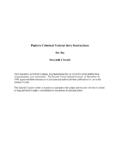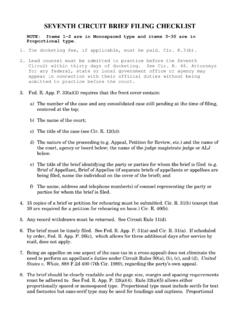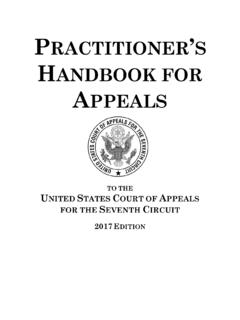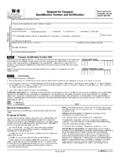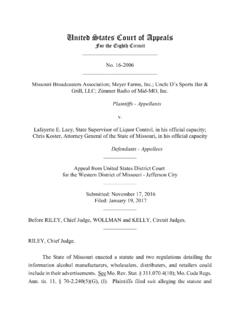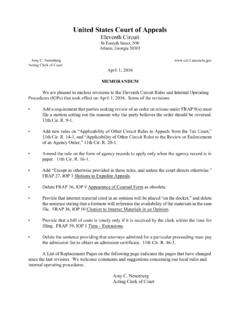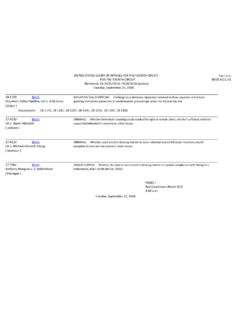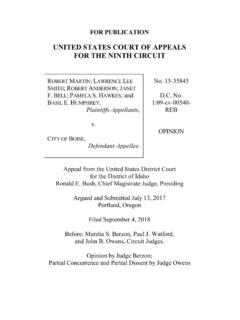Transcription of UNITED STATES COURT OF APPEALS FOR THE SEVENTH …
1 1 UNITED STATES COURT OF APPEALS FOR THE SEVENTH CIRCUIT 219 South Dearborn Street Chicago, Illinois 60604 October 11, 2017 STATEMENT ON CONFIDENTIALITY OF COURT MATERIALS All members of the legal profession are familiar with the responsibility to keep certain matters confidential. Model Rule of the American Bar Association s Rules of Professional Conduct, which have been adopted in each of the three STATES of the SEVENTH Circuit, governs the duty to maintain confidences of a current client; Rule addresses prospective clients; and Rule (c)(2) covers prior representations. See Model Rules of Prof l Conduct (Am. Bar Ass n 2016); ILCS S. Ct. Rules of Prof. Conduct (2017); 34 Ind. Admin. Code (West 2017); Wis. Stat. Ann. SCR 20 (West 2017). Although the courts in the SEVENTH Circuit are committed to providing an explanation, in the form of an opinion or order, for all of their decisions, that does not mean that all materials within the COURT are open to the public.
2 To the contrary, just as the Executive Branch enjoys a deliberative-process privilege, the Judiciary requires comparable rules to assure confidentiality of the internal deliberations among judges that occur before a decision is issued. These rules are especially important for any multi-member panel, whether the en banc COURT of APPEALS , a normal panel of three judges, or a statutory three-judge COURT , see 28 2284. Both judges and non-judicial employees of the Judiciary have this duty. For the latter, it is reflected in Canon 3D of the Code of Conduct for Judicial Employees, which provides in relevant part as follows: A judicial employee should never disclose any confidential information received in the course of official duties except as required in the performance of such duties, nor should a judicial employee employ such information for personal gain.
3 A former judicial employee should observe the same restrictions on disclosure of confidential information that apply to a current judicial employee, except as modified by the appointing authority. 2 Although the Code of Conduct for UNITED STATES Judges is written in less direct terms, it too prohibits the disclosure of internal, deliberative materials. Because of its greater generality, however, Chief Judge Diane P. Wood of the SEVENTH Circuit asked the Judicial Conference s Committee on Codes of Conduct to clarify the scope of a judge s duty. The Committee responded on August 7, 2017. It ended its response by noting that, [a]s the recipient of this letter, you may use it as you please. Had Chief Judge Wood wished to keep the letter confidential, she could have done so. The Committee provides confidential ethics advice to judges and judicial employees upon request, and does not make the response public but leaves it to the discretion of the recipient to use the advice as he or she deems appropriate.
4 This letter, however, is of general importance and interest, not only to the members of the judiciary in the SEVENTH Circuit but also to the public at large. It helps to explain what is, and what is not, public; it sheds light on matters that might be relevant to the Judicial Conduct and Disability norms; and it provides guidance to past, present, and future members of the Judicial Branch. It is therefore being posted to the SEVENTH Circuit s public website so that all interested persons can benefit from the Committee s advice. Diane P. Wood Chief Judge COMMITTEE ON CODES OF CONDUCTOF THEJUDICIAL CONFERENCE OF THE UNITED STATES_____UNITED STATES DISTRICT COURT FOR THE EASTERN DISTRICT OF VIRGINIA600 GRANBY STREET, ROOM 358 NORFOLK, VIRGINIA 23510-1915 JUDGE REBECCA BEACH SMITHTel (757) 222-7001 CHAIRFax (757) TIMOTHY S.
5 BLACKJUDGE JAMES O. BROWNINGJUDGE CHRISTOPHER C. CONNERJUDGE RALPH R. ERICKSONJUDGE THOMAS B. GRIFFITHJUDGE ANDREW J. GUILFORDJUDGE ALVIN K. HELLERSTEIN JUDGE BARBARA A. MCAULIFFE JUDGE TANYA M. WALTON PRATTJUDGE GEORGE Z. SINGALROBERT P. DEYLINGJUDGE RICHARD G. TARANTOCOUNSELJUDGE WILLIAM T. THURMANTel (202) 502-1100 JUDGE MARC T. TREADWELL Fax (202) 502-1033 JUDGE JAY C. 7, 2017 Honorable Diane P. WoodChief Judge UNITED STATES COURT of APPEALS for the SEVENTH CircuitEverett McKinley Dirksen UNITED STATES Courthouse219 South Dearborn Street, Room 2688 Chicago, Illinois 60604Re: Docket No. 2563 Dear Chief Judge Wood: Thank you for your inquiry. The Committee on Codes of Conduct (the Committee ) is pleased to respond. This response is advisory only and based solely on the judgment of the Committee members.
6 Many of the proscriptions in the Code of Conduct for UNITED STATES Judges (the Code ) are cast in general terms, and the Code is to be construed so it does not impinge on the essential independence of judges in making judicial decisions. Commentary to Canon have requested a formal opinion on a problem that has arisen in your circuit, which problem concerns the responsibility of a judge to maintain the confidentiality of internal COURT documents, including documents that relate to the deliberative process. The types of documents you reference include bench memoranda prepared for a panel of three appellate judges; draft opinions; oral or written materials from post-argument case conferences; and materials that appear only on the COURT s internal docket, as opposed to its public docket (whether because of sealing or other reasons to keep the information confidential).
7 More specifically, your inquiry STATES that an appellate judge in your circuit is in the process of completing a book on the institution of the Staff Attorney s Office in the federal courts of appeal. The book is expected to be published in the fall of this year, and you indicate that the authoring judge will be entitled to collect royalties. Your understanding is that the book will pay special attention to the Staff Attorney s Office in your circuit, but that it will also contain information about many of the other circuits offices. You include in your inquiry a description of the book in question, which description was written by the authoring judge. You identify the following excerpt from the description and note your concern, in particular, with the italicized language:The book contains very detailed critiques of a number of bench memos and draft orders by our current staff attorneys, who are in fact [a] mixed lot some very good, some handicapped by not being able to write clearly.
8 Neither peer review nor supervisory staff attorney review is adequate, and your decision on filling the supervisory staff attorney vacancies will be a critical state you have already informed the authoring judge that he is not at liberty to release internal, confidential COURT materials, such as the bench memoranda written to appellate panels by staff attorneys or the draftorders they prepared. In response, the authoring judge questioned what rule, if any, addresses what constitutes confidential COURT materials. Additionally, the authoring judge expressed to you his belief that post-argument COURT discussions should be made public. You note the authoring judge s view in that regard is not shared by any other judges onyour circuit COURT . Thus, you state that your question is whether it is proper for one judge on a multi-member COURT (whether the COURT of APPEALS , or a three-judge district COURT , or a bankruptcy appellate panel, for example) to unilaterally publish pre-decisional documents submitted to a panel of the a general matter, the Committee cannot respond to inquiries that ask questions about the conduct of other judges.
9 It is typically the responsibility of each individual judge to make his or her own ethical decisions under the Code. However, in light of a chief judge s inherent supervisory and administrative authority, the Committee may respond to a chief judge s ethical questions about the proper action she may take regarding the processes and procedures pertaining to her circuit (or district or division within) as a , while the Committee is authorized to provide advice to judges and judicial employees about their ethical responsibilities under applicable codes of conduct, the Code contemplates that chief judges may impose more stringent requirements on those individuals subject to their supervisory authority, as recognized in Canons 1 and Opinion.
10 Canon 1 STATES that judge[s] should maintain and enforcehigh standards of conduct, in addition to personally observing those same standards. (emphasis added). Canon 3 indicates that judges with supervisory authority have a responsibility to ensure that judges subject to their oversight perform their duties properly and observe appropriate standards of conduct. See Private Opinion; Canon 3A(3), 3B(4). Accordingly, the Committee s advice as to the propriety of a particular course of action does not preclude a COURT or a supervising judicial officer from imposing more specific or stringent requirementson judges of the , the Committee s response to your inquiry is intended to offer you advice under the Code regarding your supervisory and administrative role as Chief Judge in addressing the ethical implications of the conduct you describe in your letter.
